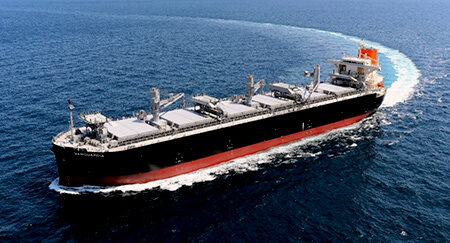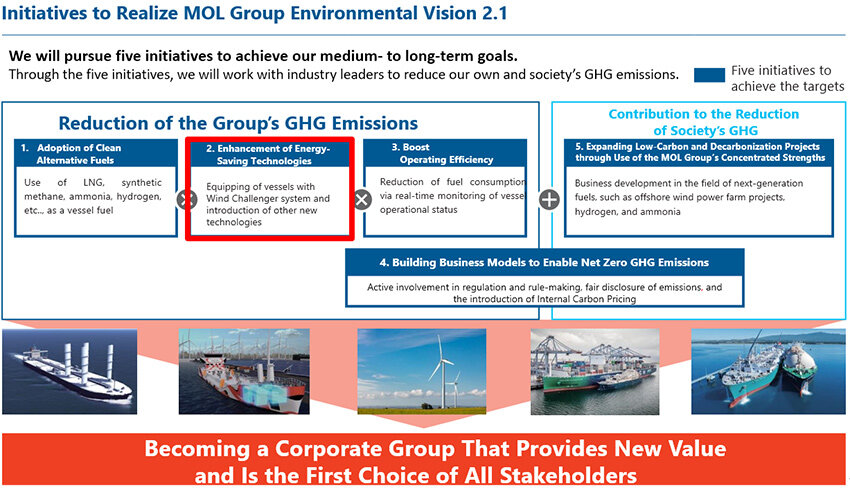- JP
- EN
Wood Chip Carrier "VANGUARDIA" Delivered
-Will Serve Daio Paper Corporation-
August 10, 2021

TOKYO-Mitsui O.S.K. Lines, Ltd. (MOL; President & CEO: Takeshi Hashimoto) today announced that on August 10, the wood chip carrier VANGUARDIA with a cargo capacity of 4.3 million-cubic feet, was delivered at Oshima Shipbuilding Co., Ltd. (Oshima Shipbuilding; President: Eiichi Hiraga; Headquarters: Saikai-shi, Nagasaki Prefecture). MOL will operate the vessel, which transport wood chips for Daio Paper Corporation (President & CEO: Yorifusa Wakabayashi; Headquarters: Chiyoda-ku, Tokyo).
The vessel is equipped with a SOx scrubber and Ballast Water Management System (BWMS) and in pre-compliance with the Energy Efficiency Design Index (EEDI) phase 3 to be in conformity with stricter environmental regulations (Note 1). It also has environmentally friendly specifications in line with "MOL Group Environmental Vision 2.1" (Note 2) such as Seaworthy Bow (a bow shape that reduces the decline in vessel speed during adverse weather) and Advanced Flipper Fins (energy-saving equipment to improve propulsion efficiency)which are Oshima Shipbuilding's technologies, Advanced Control for Ecology (ACE) (Note 3), a cutting-edge hull shape with an improved stern shape, and Propeller Boss Cap Fins (PBCF) (Note 4) in addition to adopting an electronically controlled engine and low-friction ship bottom paint.
MOL continually strives to offer safe and stable wood chip transport service for customers including paper manufacturers around the world while caring for the environment, and contribute to a stable supply of resources.
[ Outline of the vessel ]
LOA: 209.96m
Breadth: 37.00m
Depth: 22.80m
Cargo hold capacity: 4,237,833 cubic feet
(Note 1)
Emissions regulations:
Regulations to prevent air pollution generated by merchant vessels were established in Annex VI issued in 2005 of the MARPOL Treaty adopted by the International Maritime Organization (IMO). Since then, emissions regulations have been strengthened on a global scale. Starting in January 2020, the allowable sulfur content in ship fuel oil in general sea areas has been reduced to 0.5% or less. This will require the use of regulation-compliant bunker oil or installation and use of SOx scrubbers on vessels.
The Ballast Water Management Convention:
A September 2017 treaty requires the control and management of ballast water and sediment discharges. Ballast water, which is taken onboard to stabilize vessel, can move aquatic organisms to non-native habitats, where they might threaten biodiversity and harm local ecosystems. Vessels from countries ratifying the treaty are required to install an IMO-certified BWMS (Ballast Water Management System) to ensure that the number of marine organisms contained in ballast water is below the regulated level.
Energy Efficiency Design Index:
Carbon dioxide (CO2) emissions when transporting 1 ton cargo in one mile. In EEDI Phase3 which will be applicable to wood chip carriers contracted after 2025, the vessels will be required to theoretically achieve a 30% reduction in CO2 emissions from the EEDI baseline in their design phase.
MOL Group will continue to promote "Enhancement of Energy-Saving Technologies", including Propeller Boss Cap Fins (PBCF), and will continue to move forward toward the achievement of Environmental Vision 2.1.

(Note 3)
Advanced Control for Ecology (ACE) estimates disturbance effects such as wind and tide by setting the vessel's course direction, and optimally controls the helm to minimize route deviation and reduce the number of course changes required during a voyage, achieving reductions in fuel consumption.
Past press release related to ACE: MOL tests onboard the new "ACE" autopilot route control function; Results show about 1.5% energy savings | Mitsui O.S.K. Lines
(Note 4)
Propeller Boss Cap Fins (PBCF) is an energy-saving system to improve propeller efficiency and reduce vessel fuel consumption, and was developed by a group of companies including MOL.
